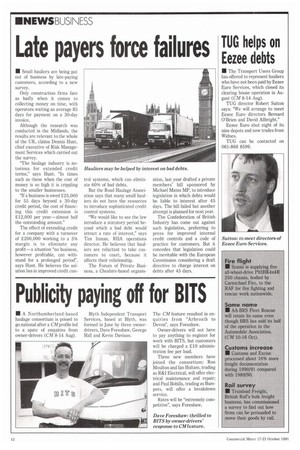Late payers force failures
Page 14

If you've noticed an error in this article please click here to report it so we can fix it.
• Small hauliers are being put out of business by late-paying customers, according to a new survey.
Only construction firms fare as badly when it comes to collecting money on time, with operators waiting an average 85 days for payment on a 30-day invoice.
Although the research was conducted in the Midlands, the results are relevant to the whole of the UK, claims Dennis Hunt, chief executive of Risk Management Services which carried out the survey.
"The haulage industry is notorious for extended credit terms," says Hunt. "In times such as these when the cost of money is so high it is crippling to the smaller businesses.
"If a business is owed £25,000 for 55 days beyond a 30-day credit period, the cost of financing this credit extension is £12,000 per year—almost half the outstanding amount."
The effect of extending credit for a company with a turnover of £200,000 working to a 5% margin is to eliminate any profit—a situation "no business, however profitable, can withstand for a prolonged period", says Hunt. He believes the solution lies in improved credit con trot systems, which can eliminate 60% of bad debts.
But the Road Haulage Association says that many small hauliers do not have the resources to introduce sophisticated credit control systems.
"We would like to see the law introduce a statutory period beyond which a bad debt would attract a rate of interest," says Tim Inman, RHA operations director. He believes that hauliers are reluctant to take customers to court, because it affects their relationship.
The Forum of Private Business, a Cheshire-based organis ation, last year drafted a private members' bill sponsored by Michael Mates MP, to introduce legislation in which debts would be liable to interest after 45 days. The bill failed but another attempt is planned for next year.
The Confederation of British Industry has come out against such legislation, preferring to press for improved internal credit controls and a code of practice for customers. But it concedes that legislation could be inevitable with the European Commission considering a draft directive to charge interest on debts after 45 days.




















































































